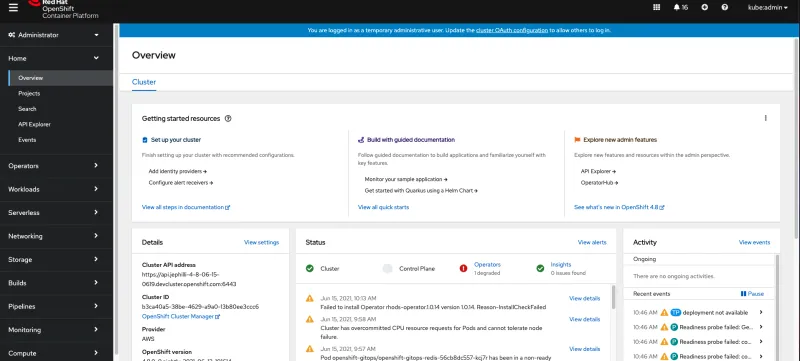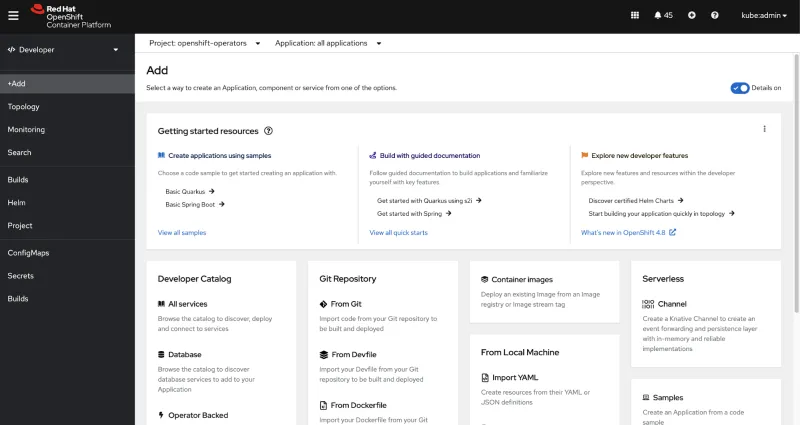Throughout 2020 and 2021, the OpenShift team held a number of Customer Empathy Workshops to collect important insights from users, like you, around pain points they encounter when using the console. The OpenShift Troubleshooting Workshop was especially important as it highlighted a part of the product experience that we had not fully fleshed out: “Getting Started.” Customers pointed out that OpenShift includes installation challenges, making it difficult to get started setting up new features. They also noted that the steep learning curve makes it difficult for new users with a lack of Kubernetes knowledge to use the UI efficiently. Lastly, they highlighted the importance of dependencies and being able to resolve a single parent resource that would update related resources. With the addition of quick starts in OpenShift 4.6, we were able to begin solving some of these issues, helping you get started with guided tutorials. Quick starts have evolved since and play an extremely important role in the newest getting started feature added to OpenShift 4.8.
Getting Started Resources
The new getting started card builds on the quick starts card that lived on the Cluster Overview and Add page, which was released in OpenShift 4.7. It includes various resources for you to get up and running with OpenShift, from the moment you land in the console. Depending on the perspective and the user’s permissions, the content of the card will change, ensuring the material directly relates to your experience.
Getting Started Resources for Developers
Developers can quickly get started creating applications by using featured samples, including the Quarkus and Spring Boot samples, or by choosing a different one from our samples catalog (see No. 1 below). Quick starts are easily available as well to help developers learn more about Kubernetes and get up and running with step-by-step instructions and tasks (see No. 2). Lastly, you will be more in-tune with the newly released features in the developer perspective, including Helm Charts and quick search in topology, as well as the rest of the new features in the what’s new in OpenShift blog (see No. 3):

Getting Started Resources for Admins
Admins can now start with a list of setup instructions to get the most out of their cluster by referencing the items in the Set up your cluster section (No. 1 below). These steps will remain only if they have not been completed, and once they have been completed, the column will be removed. Quick starts are, again, a focal point for admins to be able to reference documentation within the console rather than having to exit the UI (No. 2). They will also be up to date with the newest features in the admin perspective, including the API Explorer and console customizations, as well as the rest of the new features in the what’s new in OpenShift updates (No. 3):

How the Card Works


Each column of the card acts as an actionable sector to help you get started, and some are even dynamically updated depending on what has already been configured and completed in the cluster. By adding this dynamic functionality, we are able to provide the most helpful resources to you, whether you are coming into the console for the first time or not. The card can be removed from the dashboard by selecting more options in the menu and then Hide from view.

The card can also be brought back to the dashboard by clicking the label that will appear in the page header. If you do not want to ever bring back the card, you can remove the label by clicking the X.

Summary and Next Steps
With the help of getting started resources, we hope to enrich the OpenShift experience for you, whether you are a novice or expert. We will continue to iterate and add to the getting started experience in the coming releases, and we would appreciate any feedback. If you are interested in sharing your feedback about the getting started card, sign up to participate in our research study. You can also sign up for feedback sessions to share your input on current OpenShift features and new designs.
저자 소개
채널별 검색
오토메이션
기술, 팀, 인프라를 위한 IT 자동화 최신 동향
인공지능
고객이 어디서나 AI 워크로드를 실행할 수 있도록 지원하는 플랫폼 업데이트
오픈 하이브리드 클라우드
하이브리드 클라우드로 더욱 유연한 미래를 구축하는 방법을 알아보세요
보안
환경과 기술 전반에 걸쳐 리스크를 감소하는 방법에 대한 최신 정보
엣지 컴퓨팅
엣지에서의 운영을 단순화하는 플랫폼 업데이트
인프라
세계적으로 인정받은 기업용 Linux 플랫폼에 대한 최신 정보
애플리케이션
복잡한 애플리케이션에 대한 솔루션 더 보기
가상화
온프레미스와 클라우드 환경에서 워크로드를 유연하게 운영하기 위한 엔터프라이즈 가상화의 미래
